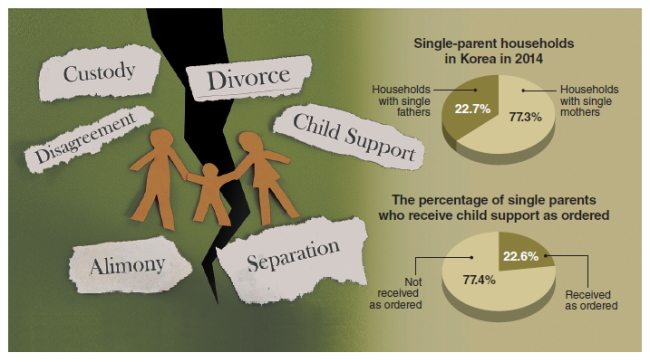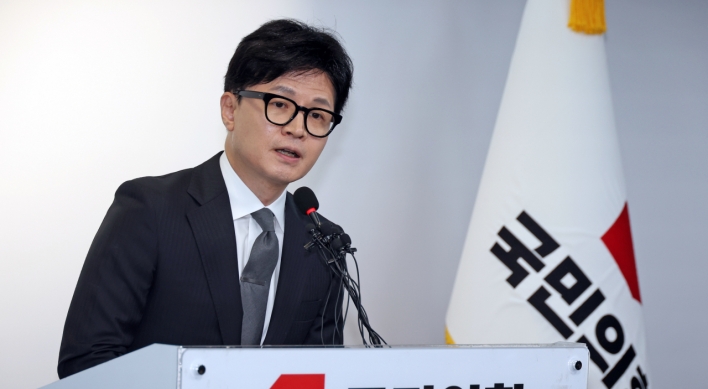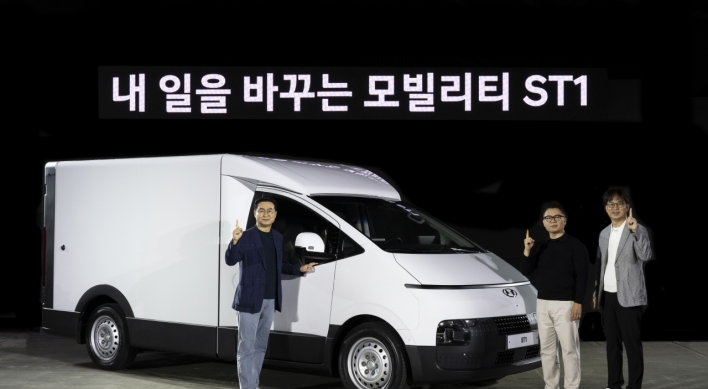In 2010, Kim Sun-young, an unwed mother, sued her ex-boyfriend for child support. The 35-year-old had no income at the time and was relying on a state subsidy to take care of her son. It took her a year and a half to win the case, with the court ordering her ex to pay her 300,000 won ($270) every month.
Kim’s uphill battle, however, continued, as her ex-boyfriend cut off all contact shortly after the verdict, leaving Kim still empty-handed.
“I didn’t want to go through that lawsuit ever again. ... It was the most stressful thing I’d ever done,” she told The Korea Herald. “What is worse is that all that stress was for nothing.”
Kim is one of some 390,000 single parents in Korea who have never received child support from the other parent.
In 2012, 83 percent of all single parents in the country said they were never paid child support. Of those, only 4.6 percent filed a lawsuit. Even among those who won their cases, 77.4 percent said they did not receive support from the other parent, in spite of a judgement from the court.

As of 2014, 77.3 percent of all Korean single parents were women.
In order to tackle the problem, the Gender Equality Ministry will begin the operation of an agency on Wednesday to support child-rearing single parents by enforcing child support payments. Those who utilize the agency’s services will be able to sue the other parent for a child support order for free and hire a collector to collect overdue payments. The agency will also help parents track down the other parent should they cut off contact to avoid payments.
“The main goal of this newly launched service is to provide a safe environment for children of single-parent households and guarantee their access to necessary resources,” said Park Bok-soon, a scholar who participated in the foundation of the agency.
Korea’s lack of late child support payment penalties, as well as enforcement, are linked to the country’s high overseas adoption rates, as well as the low income of single-parent households. About 90 percent of Korean adoptees are born to unwed, single mothers who have few resources to raise their children alone and are vulnerable to social stigmatization.
According to government data, the average monthly income of single-parent households was 1.72 million won, which is less than half the average of all households in the country at 3.53 million won. Meanwhile, it costs about 5 million won to file a lawsuit to get child support.
Shannon Doona Heit, a Korean adoptee and a Seoul-based activist, said the establishment of the agency was a “step in the right direction as far as ensuring the rights of unwed mothers to be able to raise their children.”
“I think (Korea’s high overseas adoption rate) has been a combined problem of lack of paternal responsibility, both time and money, as well as lack of support from the government,” Heit said.
“Knowing they are unable to enforce child support from the father, knowing the discrimination they’ll face in the workplace, knowing the lack of government support, many women feel adoption is their only realistic option.”
The Korean government currently offers a monthly allowance of 150,000 won for domestic adoptive parents for child care costs, but 100,000 won for single parents including unwed and divorced mothers.
Even for mother Kim, having to raise her son alone was the biggest challenge. The beauty industry worker was forced to take multiple part-time jobs to support her baby while she stayed at a single mothers’ shelter. Before taking her current job, Kim’s monthly income was unstable, ranging from as little as 300,000 won up to 1 million won.
“I thought maybe it was better for him if I just gave him up for adoption,” she said.
Kim pursued her lawsuit with the support of the state-run Korea Legal Aid Corporation, which is collaborating with the Gender Ministry for the newly launched service. Kim’s experience, however, was not positive, as even her own lawyer suggested that she withdraw the case and “persuade” her ex’s family instead.
“The lawyer once told me to visit my ex’s parents on traditional holidays with the baby,” she said.
“He said once they see the baby, maybe the families would change their mind and decide to support him. If that was the case, I wouldn’t have filed the suit to begin with.
“This is why the lawsuit was so stressful. ... Imagine a lawsuit where you have to persuade your own lawyer.”
Kim Eun-hee, a Daegu-based activist for single parents’ rights, said laws should be further fortified to impose a criminal penalty for overdue child support payments.
The activist said she witnessed a number of single mothers being threatened by fathers of their babies. One mother, for instance, withdrew her case after her ex-boyfriend’s mother verbally attacked her for “ruining her son’s reputation,” and threatened to take custody of the child.
“The new service seems promising, but I’m not sure how much of a change it will bring,” she said. “From our personal experiences, we doubt that civil punishments would do much.”
By Claire Lee (dyc@heraldcorp.com)
Kim’s uphill battle, however, continued, as her ex-boyfriend cut off all contact shortly after the verdict, leaving Kim still empty-handed.
“I didn’t want to go through that lawsuit ever again. ... It was the most stressful thing I’d ever done,” she told The Korea Herald. “What is worse is that all that stress was for nothing.”
Kim is one of some 390,000 single parents in Korea who have never received child support from the other parent.
In 2012, 83 percent of all single parents in the country said they were never paid child support. Of those, only 4.6 percent filed a lawsuit. Even among those who won their cases, 77.4 percent said they did not receive support from the other parent, in spite of a judgement from the court.

As of 2014, 77.3 percent of all Korean single parents were women.
In order to tackle the problem, the Gender Equality Ministry will begin the operation of an agency on Wednesday to support child-rearing single parents by enforcing child support payments. Those who utilize the agency’s services will be able to sue the other parent for a child support order for free and hire a collector to collect overdue payments. The agency will also help parents track down the other parent should they cut off contact to avoid payments.
“The main goal of this newly launched service is to provide a safe environment for children of single-parent households and guarantee their access to necessary resources,” said Park Bok-soon, a scholar who participated in the foundation of the agency.
Korea’s lack of late child support payment penalties, as well as enforcement, are linked to the country’s high overseas adoption rates, as well as the low income of single-parent households. About 90 percent of Korean adoptees are born to unwed, single mothers who have few resources to raise their children alone and are vulnerable to social stigmatization.
According to government data, the average monthly income of single-parent households was 1.72 million won, which is less than half the average of all households in the country at 3.53 million won. Meanwhile, it costs about 5 million won to file a lawsuit to get child support.
Shannon Doona Heit, a Korean adoptee and a Seoul-based activist, said the establishment of the agency was a “step in the right direction as far as ensuring the rights of unwed mothers to be able to raise their children.”
“I think (Korea’s high overseas adoption rate) has been a combined problem of lack of paternal responsibility, both time and money, as well as lack of support from the government,” Heit said.
“Knowing they are unable to enforce child support from the father, knowing the discrimination they’ll face in the workplace, knowing the lack of government support, many women feel adoption is their only realistic option.”
The Korean government currently offers a monthly allowance of 150,000 won for domestic adoptive parents for child care costs, but 100,000 won for single parents including unwed and divorced mothers.
Even for mother Kim, having to raise her son alone was the biggest challenge. The beauty industry worker was forced to take multiple part-time jobs to support her baby while she stayed at a single mothers’ shelter. Before taking her current job, Kim’s monthly income was unstable, ranging from as little as 300,000 won up to 1 million won.
“I thought maybe it was better for him if I just gave him up for adoption,” she said.
Kim pursued her lawsuit with the support of the state-run Korea Legal Aid Corporation, which is collaborating with the Gender Ministry for the newly launched service. Kim’s experience, however, was not positive, as even her own lawyer suggested that she withdraw the case and “persuade” her ex’s family instead.
“The lawyer once told me to visit my ex’s parents on traditional holidays with the baby,” she said.
“He said once they see the baby, maybe the families would change their mind and decide to support him. If that was the case, I wouldn’t have filed the suit to begin with.
“This is why the lawsuit was so stressful. ... Imagine a lawsuit where you have to persuade your own lawyer.”
Kim Eun-hee, a Daegu-based activist for single parents’ rights, said laws should be further fortified to impose a criminal penalty for overdue child support payments.
The activist said she witnessed a number of single mothers being threatened by fathers of their babies. One mother, for instance, withdrew her case after her ex-boyfriend’s mother verbally attacked her for “ruining her son’s reputation,” and threatened to take custody of the child.
“The new service seems promising, but I’m not sure how much of a change it will bring,” she said. “From our personal experiences, we doubt that civil punishments would do much.”
By Claire Lee (dyc@heraldcorp.com)



![[Exclusive] Korean military set to ban iPhones over 'security' concerns](http://res.heraldm.com/phpwas/restmb_idxmake.php?idx=644&simg=/content/image/2024/04/23/20240423050599_0.jpg&u=20240423183955)

![[Graphic News] 77% of young Koreans still financially dependent](http://res.heraldm.com/phpwas/restmb_idxmake.php?idx=644&simg=/content/image/2024/04/22/20240422050762_0.gif&u=)



![[Pressure points] Leggings in public: Fashion statement or social faux pas?](http://res.heraldm.com/phpwas/restmb_idxmake.php?idx=644&simg=/content/image/2024/04/23/20240423050669_0.jpg&u=)









